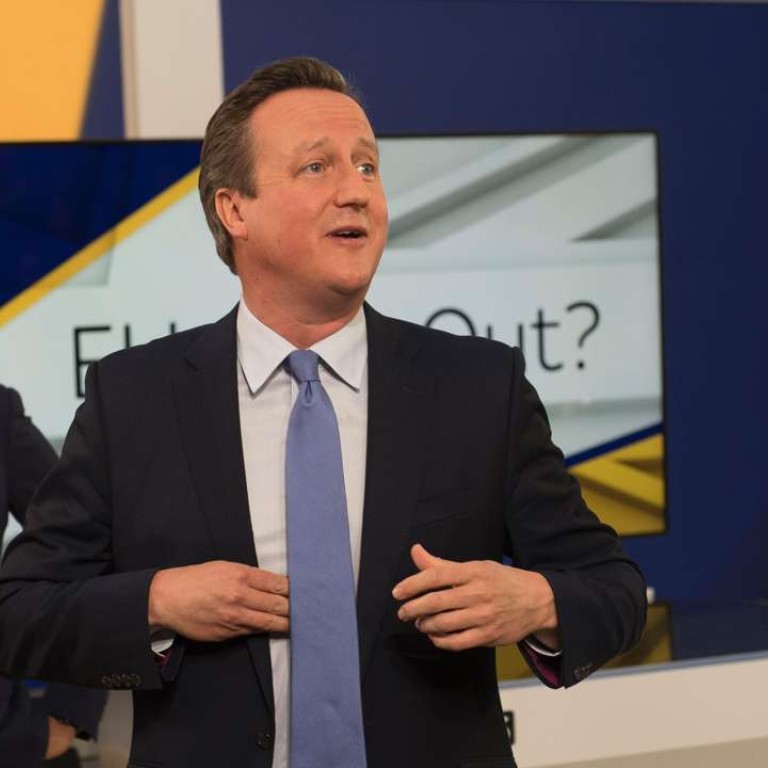
Here’s how a Brexit ‘yes’ decision could trigger another economic depression
A vote to leave the European Union could knock London stocks by 10 per cent and bring on other economic calamities
Nobody likes two-minded, “on the one hand and on the other hand” economists – this economist included. But it is time to come off the fence and get the formalities over Britain’s imminent European referendum out of the way without further ado.
If Britain votes to remain in the EU on the 23rd June, the impact will be a damp squib and the dust should settle very quickly. But if UK voters opt to quit Europe, it will amount to a national economic disaster, on par with the 1930s depression and 2008’s financial crisis. This time round, there may be no easy way back from what would be left of Britain’s broken economy.

Exit from the EU could mean the UK’s exclusion from the 500-million strong free trade area for an unspecified period of time. It would cast a major shadow over British business’ output, investment and hiring intentions. The risk of recession and mass unemployment would be a high probability.
Consumer confidence could be hit very hard as would the UK’s supposedly rock-solid housing market. In recent years, UK property prices have been pumped up to fever-pitch thanks to near-zero interest rates, over-abundant mortgage finance and a rush of foreign money buying upinvestments in London’s bloated property market. Brexit could sound the death-knell for a new property crash. People forget too easily that nationwide UK house prices collapsed by 20 per cent in the aftermath of 2008’s global financial crisis. It could easily happen again.
Brexit could mark the start of a catastrophic collapse in foreign direct investment into the UK. Since Britain first joined the EU in 1973, North American and Asian companies have invested heavily in the UK economy to secure unbridled access to European markets. Outstanding foreign direct investment in the UK are now worth around US$1.7 trillion and any reversal of confidence would put serious strains on the economy and UK currency if they decide to pull out.
Any threat to London’s dominance as a global financial hub would spark a serious outflow of overseas banks and investment funds from Britain, especially if Brussels decides to stack up legislative rules against institutions operating out of the UK. Major foreign banks have already warned that they are preparing contingency plans to relocate to European cities like Frankfurt, Paris and Dublin in the event of Brexit. Britain’s financial services dominated economy would be hit hard, compromising the UK’s fragile balance of payments position even more.
Brexit might mark the end of the 300-year old United Kingdom. Scottish nationalists have warned that Brexit would lead to another vote for independence. If Scotland leaves the union, at a stroke, up to 8 per cent of GDP would be lopped off the UK economy. Ratings agencies have warned this would warrant a major UK sovereign downgrade – bad news for the pound.
There may be little immediate economic effect in the aftermath of a leave vote, but in the longer run, Britain could be staring into the jaws of a depression. Putting numbers onto the horror show is extremely arbitrary, but the number 10 keeps cropping up. A depression would mean national output dropping at least 10 per cent and unemployment surging above 10 per cent.
The impact on financial markets would be immediate though – and the number 10 crops up again. Market surveys suggest the pound could lose as much as 10 per cent in face value and Britain’s FTSE-100 stock index could fall by 10 per cent. The odds are the falls would be even greater. The pound could easily touch parity with the US dollar and the euro. It would be a nasty rout.
Right now, markets still seem to be putting on a brave face, with the bias favouring the status quo and Britain staying put. But the real event risk is the chance of the unimaginable happening.
Judging by the bandwagon effect in the leave camp right now, consumers, business and markets would be wise to batten down the hatches and prepare for an unexpected shock.
David Brown is chief executive of New View Economics

